The Birds Or: Everything You Always Wanted to Know About Coronavirus (But Were Afraid to Ask Hitchcock & Heidegger), Part Two
Derek Hawthorne5,115 words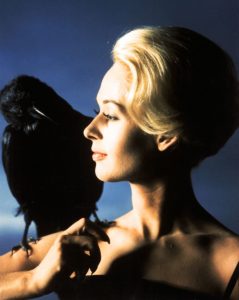
The next day, Melanie attends Cathy’s birthday party, as promised. It is held outdoors at the Brenner home, behind the house. A dozen or more children are present, along with some parents. Annie is also on hand, to help out. Colorful balloons have been strung up, and there is a long table covered in cake and other treats. Mitch and Melanie (still wearing her green suit) have been drinking and decide to leave the party briefly while the children play.
They walk up onto one of the dunes behind the house. Mitch is carrying a carafe, in which he has mixed martinis, and two glasses. At this point, there is a jarring cut onto what is very obviously an interior set recreating the dune, with a painted backdrop of the bay. Technically, this is the low point in a film that already contains quite a few unrealistic shots and special effects. Audiences in 1963 would also have detected the phoniness of this transition to a soundstage, but it was a convention they were willing to accept. Today’s audiences are not as forgiving. 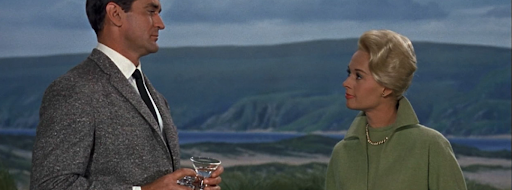
The truth is that Hitchcock could easily have avoided this obvious artificiality by simply shooting the entire scene on location. But, as Tippi Hedren has explained on more than one occasion, he wanted to avoid location shooting as much as possible so as to photograph scenes under controlled lighting (especially closeups). This is obviously a reflection of Hitchcock’s character: by all accounts, he was an advanced “control freak,” something Hedren had to contend with throughout the making of both this film and Marnie (1964). For example, Hitchcock had Edith Head design a wardrobe for the actress to wear off set, insisted on placing single quotation marks around her nickname ‘Tippi’ (her given name was Nathalie), and made increasing demands on her time. (In short, he became Scottie in Vertigo.)
The scene on the dunes is also interesting because it was here that Hitchcock insisted on certain “improvements” to Evan Hunter’s script. Melanie reluctantly partakes of Mitch’s martinis, saying that she is concerned about driving home. He frankly admits that he is trying to get her to stay for dinner. “What’s so important in San Francisco?” Mitch asks. Much to his amusement, she explains that she needs to go to work. Incredulous, he says “You have a job?” “I have several jobs,” she responds proudly. She works for travelers’ aid at the airport on Mondays and Wednesdays. On Tuesdays, she takes a course in general semantics at Berkeley. On Thursdays, she meets with a committee that raises money to put “a little Korean boy” through school. On Fridays, Melanie says, jokingly, she sometimes goes to bird shops. “I’m glad you do,” Mitch responds, obviously smitten.
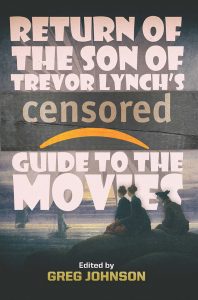
You can buy Return of the Son of Trevor Lynch’s CENSORED Guide to the Movies here
Of course, none of these are a real “job.” This information serves to reinforce our impression that Melanie is not just a spoiled little rich girl, but also a lost soul. Her project to raise money for a Korean boy rather than, say, a white American boy from the Ozarks, illustrates her detachment from the affairs of ordinary folks and, of course, from her own tribe. And we will soon see tribalism emerge as one of the themes in The Birds. Further, the reason Melanie is taking a general semantics course is to acquire a lot of profane words to teach the myna bird she was trying to buy in the film’s first scene — an intended gift for her straitlaced and easily-shocked Aunt Tessa! In Evan Hunter’s original script, after she reveals this to Mitch, “suddenly, a very serious look comes into Melanie’s face.” She becomes “serious, introspective.” Then she says, “That’s silly, isn’t it? Teaching a bird to shock my aunt. That’s just silly and childish.” And, after a pause: “Maybe I ought to go join the other children.” With that, she descends the dune and returns to the party.
However, Hitchcock had doubts about Hunter’s script, feeling that the characters lacked depth. So, he sought the opinion of actor and writer Hume Cronyn (the husband of Jessica Tandy) who had contributed to the screenplays for Rope (1948) and Under Capricorn (1949). One of the results of this, apparently, was new dialogue inserted into this scene. [1] In the version that was shot, just after Melanie tells Mitch about the myna bird, he says, jokingly, “You need a mother’s love, my child.” She responds, sharply, “not my mother!” then goes on to tell him how her mother “ditched” their family when she was a little girl. “You know what a mother’s love is,” she says with a snarl. But the remark only puzzles Mitch.
When he asks her if she has contact with her mother still, Melanie suddenly turns her back to Mitch and says, sobbing slightly and in a childlike voice, “I don’t know where she is.” This is then followed by the line which closed the scene in the original script: “Maybe I ought to go join the other children.” The new dialogue is intended to lay the groundwork for the suggestion, made clear in the very last scene of the film, that Lydia becomes a kind of surrogate mother to Melanie. However, it has always seemed gratuitous to me, and far less interesting than the film’s other subplots and themes. This interlude on the dunes is perhaps the least effective scene in the entire film.
When Mitch and Melanie return to the party, the children are playing blind man’s bluff (the first of many references to blindness in the film; see my discussion of this near the end of part one). Cathy is blindfolded and Annie is spinning her around, but the entire time, Annie’s eyes are on Mitch and Melanie. Lydia watches the couple too, with an expression of great apprehension. Just as Cathy begins to try to catch the other children, a gull swoops down. “Look! Look!” cries a little boy. The gull grazes Cathy but she thinks it is one of the other kids. “No touching allowed!” she cries, annoyed. Now gull after gull swoops in, divebombing the party-goers and bursting the balloons.
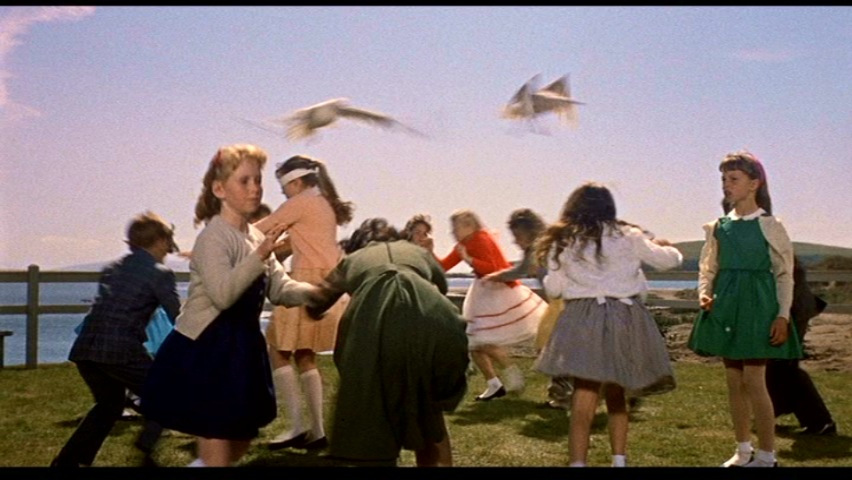
The gulls ignore the table full of food and seem to deliberately attack the children, who begin screaming in terror and running in all directions. Melanie uses her jacket to chase off one gull, which has a child pinned to the grass, pecking at his back. Mitch comes to the aid of another child, who is being pursued up the dunes by an angry gull that seems determined to cause her harm. These shots were accomplished by actually tying the gulls to the unfortunate child actors! It is one of the more effective attack scenes in the film, largely because it seems to have been accomplished primarily with live birds, and the use of special photographic effects is comparatively minimal.
The adults finally manage to herd the panicked children into the house, and the seagulls disperse just as suddenly as they arrived. Everyone stands just inside the doors to the veranda, staring up at the sky and trying to make sense out of what has happened. It is at this point in the film that the characters recognize a pattern is forming. First, there was the gull that struck Melanie, then the gull that collided with Annie’s front door (something Mitch has not heard about until this moment), and now the attack on the children’s party.
That all the attacks so far involve seagulls seems to be a deliberate red herring. Our first reaction will be to assume that something is wrong with the gulls — that these strange anomalies are confined to them. Our minds look for the common elements in phenomena we wish to explain. Until we have found the common element, we are in a state of anxious suspension. When we think we have found some sort of commonality, we feel a sense of relief, for at least (so we suppose) the troubling phenomenon is delimited; it affects this much, and not that. But, in this case, we get a sinking feeling when we remember the chickens; their behavior has been strange as well. As we will see, all attempts to explain the bird attacks in this film ultimately fail.
Melanie is decidedly spooked and it is now easy for Mitch to persuade her to stay for dinner, which takes place in the following scene. Mitch has sliced the leftover roast beef from the previous night, and the foursome (Mitch, Lydia, Cathy, and Melanie) serve themselves, sitting and eating casually in the living room. The adults discuss the best way for Melanie to get back to San Francisco. Lydia is obviously very intent on getting Melanie out of Bodega Bay, and shoots Cathy a sharp glance when the little girl, who clearly likes Melanie, suggests that she use their spare bedroom and stay the night. The lovebirds are making a racket in their cage, and just as Cathy notes this fact, Hitchcock’s camera focusses on Hedren’s face as she looks down and toward the hearth. The actress looks exquisitely beautiful in this shot, which is ever-so-slightly in soft focus. We then see her point of view: a small, brown sparrow suddenly appears out of nowhere, sitting on the hearth. “Mitch,” Melanie calls out softly — just as a great torrent of sparrows comes rushing down the chimney and fills the room.
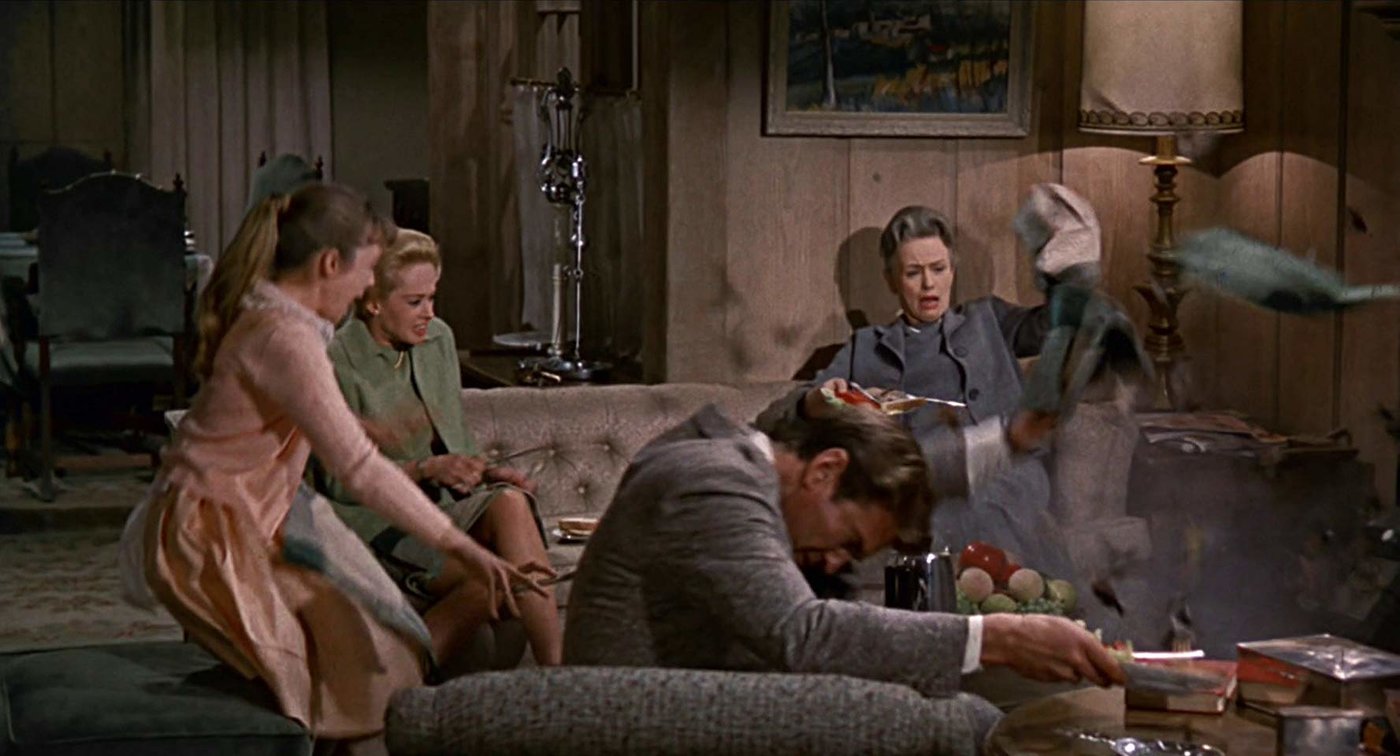
It is an indescribably eerie moment, which always gives me a shiver. There is nothing at all “supernatural” in The Birds; no hint that anything like witchery is at work. Yet Hitchcock succeeds from here on out in conveying a very strong experience of the uncanny. This is the film’s real power.
Old English cann means “knowledge,” from cunnan meaning “to know, to be familiar with” and also “to know how to.” (Compare German kennen and können.) The “canny” is what is known or familiar, and what we have a handle on. (A “canny” person is a “knowing” person whose knowing makes them particularly capable: they know how to.) The uncanny is thus not just the unknown or unfamiliar, but something that resists our efforts to get a handle on it; to manipulate it, or make it intelligible. The uncanny is thus disconcerting and unsettling. It challenges our power and threatens to overturn our sense that we “have a handle on things,” or have things under our control.
We can arrive at a more precise sense of the uncanny by examining its German equivalent: unheimlich (adj.; the uncanny is das Unheimliche). The heim in the adjective heimlich is cognate with English “home,” and so this word really ought to mean “familiar” (i.e., “homey”). Yet what heimlich actually means in German is “secret” (compare the noun Geheimnis, “secret”). This makes unheimlich a very strange word, since the un– (same as English un-; “not,” as in “unhappy”) would seem to negate “secret,” making the unheimlich that which is no longer secret, or that which has been revealed. The standard way that linguists deal with this problem is to say that the heimlich in unheimlich is not the usual heimlich; that here it really does mean “familiar” (“homey”), rather than “secret.”
In his essay on the uncanny, Freud suggests that matters may be more complicated than this:
[A]mong its different shades of meaning the word heimlich exhibits one which is identical with its opposite, unheimlich. What is heimlich thus comes to be unheimlich. . . . In general, we are reminded that the word heimlich is not unambiguous, but belongs to two sets of ideas, which, without being contradictory, are yet very different: on the one hand it means what is familiar and agreeable, and on the other, what is concealed and kept out of sight. Unheimlich is customarily used, we are told, as the contrary only of the first signification of heimlich, and not of the second.
The nature of the uncanny/Das Unheimliche may be discovered through understanding this dual sense of being both, as it were, “the un-secret” and the “un-homey.” [2] Das Unheimliche does not mean “the un-secret” in the sense of something that had been hidden and unknown but is now revealed and fully known. Instead, what it means is something hidden that now shows itself but nonetheless remains hidden. In other words, to be in the presence of the uncanny is to be confronted with a phenomenon that remains intransigently unintelligible. Something does emerge out of hiddenness here, but this something is an enigma. Or, to put it even more simply, in the encounter with the uncanny, a mystery is revealed (while remaining a mystery). (It helps to know, in addition, that in German Geheimnis can mean “secret” or “mystery.”) For this reason, the uncanny is at the same time the un-homey, the fundamentally unfamiliar.
The encounter with the uncanny is a complete and total shock to human consciousness. It occasions a feeling of dread, and the realization that perhaps everything we have thought is wrong. It chastens us, as we are brought face to face with our arrogance in thinking we knew, when we did not. We will see that, ultimately, the principal theme of The Birds has to do with this encounter with the uncanny.
To return to our story, in a moment the living room fills with what looks like hundreds of small birds. The women panic, but Mitch springs into action. He opens a window and begins trying to fan the birds out of the room with a towel, then he upends a table and places it against the fireplace. In order to shoot this scene (and others) the entire set was surrounded by a net and “bird wranglers” were on hand to deal with the animals. The trouble was that many of the birds failed to exhibit the frenetic activity the director was looking for, and some simply perched on the furniture. Plus, it was necessary to limit the number of birds on set, for the safety of the actors. “Cover your faces! Cover your eyes!” Mitch orders the women, with good reason (it is also a portent of things to come, as we shall see).
The result was that the scene was insufficiently dramatic. Hitchcock solved this problem by engaging the services of Disney’s veteran visual effects man Ub Iwerks (among other things, the designer of Oswald the Lucky Rabbit and Mickey Mouse). Iwerks took footage of birds flying inside a glass booth and, using an optical printer, superimposed that footage onto the film taken on set. For this, and his work on other scenes in The Birds, Iwerks was nominated for an Academy Award.
In this scene, at least, the result of Iwerk’s labors is pretty good, but not perfect. It is clear to the audience that some trick is involved, as there appears to be a surface level of bird images that is “flat” and with which the actors do not interact. At the same time, however, we can clearly see that there is depth to the composite image as a whole: some birds are clearly on set and flying through the room. This causes us to question our initial judgment and to suspend disbelief and become caught up in the drama of the scene. After the characters escape through a side door into another part of the house, the final shot of this sequence shows the room filled with hundreds of actual birds. This causes us, subconsciously, to question whether we were right in thinking there was anything “fake” here at all — at least on an initial viewing! The entire technique is very clever, and, on the whole, it’s one of the most effective scenes in the film.

The sheriff is summoned, but his uselessness is quickly apparent when he picks up a dead bird from the living room floor and says, “that’s a sparrow, all right.” The Brenners want him to “do something.” But, in fairness, what can he do? “Those birds attacked,” says Lydia forcefully, referring to the behavior of the gulls at Cathy’s party. “Now, Lydia, ‘attack’ is a pretty strong word, don’t you think?” the sheriff responds. “I mean, birds just don’t go around attacking people without no reason, you know what I mean? The kids just probably scared them, that’s all.” But Lydia is insistent: “These birds attacked!” As we shall see, of all the characters in the film, Lydia may be one who sees most clearly that they are now in an “us vs. them” situation. The sheriff departs, and much to Lydia’s consternation, Mitch suggests that Melanie stay the night. She responds, “I think I should, don’t you?” Despite her intentions, she has become emotionally involved with this family, and chooses now to share their fate.
The next morning, we see Melanie rise from bed in her unpretentious nightdress. We also hear the voices of Mitch and Lydia. The latter is saying that she intends to visit Dan Fawcett’s farm after dropping Cathy at school, presumably to ask him about the behavior of his chickens. In the finished film, it is at this point that we dissolve to Lydia arriving at Fawcett’s place. In the screenplay, however, there is a scene involving Mitch and Melanie that takes place after Melanie comes downstairs. We know (based on production photos) that this scene was actually shot, but it was omitted from the final cut, and the footage appears lost. It is quite an interesting scene, in fact, and, as a friend of mine put it, “very reactionary.”
In the omitted scene, Melanie comes downstairs in her nightdress, helps herself to coffee, then steps outside. It’s a beautiful day, and her eyes scan the horizon. “There isn’t a bird anywhere in sight,” Evan Hunter’s screenplay specifies. “The day is still and clear, but somehow ominous in its silence.” She sees Mitch, across the property, busying himself with a rake. He sees her as well, and starts towards her. She watches him approach, “her eyes glowing.” But she is disappointed when, instead of joining her, he enters the house by another door. Mitch quickly re-emerges, however. He has changed his shirt, and walks towards her, buttoning it. (The intention here was probably to give the audience a glimpse of Rod Taylor’s skin; handsome, virile actors were constantly changing their shirts in films of the time.)
“It’s hard to believe anything at all happened yesterday, isn’t it? It’s so beautiful and still now,” Melanie says. But then she tells him, mischievously, that she thinks she’s “got it all figured out.” Mitch asks her to explain. “It’s an uprising,” she says, her tongue in cheek. “It all started a few months ago with a peasant sparrow up in the hills, a malcontent. He went around telling all the other sparrows that human beings weren’t fit to rule this planet, preaching wherever anyone would listen. . .”
“Growing a beard!” Mitch interjects. Today’s audiences might not understand such a reference, but in the 50s and 60s, having a beard was usually taken as evidence of radicalism. Melanie is delighted by this. “Yes, of course, he had to have a beard! ‘Birds of the world, unite!’ he kept saying, over and over. . . Eventually, even the more serious-minded birds began to listen. ‘Why should humans rule. . .?’ Why should we submit ourselves to their domination. . .? And all the while, that sparrow was getting in his little messages. Birds of the world, unite. . .! You have nothing to lose but your feathers.”
Hunter tells us, “They both burst out laughing, then fall into silence, then laugh again and finally are silent. The garden is deathly still.” Silence is one of the film’s most notable features, and it is used repeatedly to create suspense, and to suggest the presence of the uncanny. One might think that this was Hitchcock’s contribution, yet the screenplay references “silence” or things being “silent” fifty-nine times (the word “still” is used in the sense of “silent” an additional ten times).

You can buy Greg Johnson’s From Plato to Postmodernism here
Mitch suddenly tries to be serious, reassuring Melanie that the birds are probably just hungry (this is an explanation that is repeated throughout the film, despite being refuted again and again). “With my little sparrow leading the team,” she says. They laugh again, but now it feels forced. “Like children who have told themselves a too-realistic horror story, they are becoming a little frightened.” “It’s so damn quiet out there,” Mitch says. “It makes you feel as if they’re. . . they’re waiting or. . . resting. . . or. . .” Melanie responds, struggling to articulate an intuition. Seeing that she’s frightened, Mitch tries humor again. “No, they’re having a meeting, Melanie. Your sparrow is standing on a soapbox and. . .”
He cuts himself off when he sees that the expression on her face is deadly serious. “His voice trails. His face becomes serious, too. Again, the garden is silent.” There is a close shot of Melanie, “her face set and grim, her eyes serious, her words coming slowly and with the chill of horror on them.” “They were angry,” she says. “They came out of the chimney in fury. I had the feeling they wanted each and every one of us dead.” This is an observation that will be repeated later on, in a memorable scene set in the Tides Restaurant.
Mitch takes Melanie in her arms, trying to comfort her. “I’m frightened,” she says. “I’m frightened and confused and I. . . I think I want to go back to San Francisco where there are buildings and. . . and concrete and. . . everything I know.” This is, of course, the natural human response to an encounter with the uncanny. One wants to retreat into the familiar. In this case, it seems that nature has turned on them, revealing itself in a new and inexplicable way. So naturally, Melanie wants to return to the world of “buildings and concrete,” the human-contrived world which we think we can control. She looks up at him and says, “Oh, damn it, why did you have to walk into that shop?” It is an annoying line, and it results in the inevitable kiss. Here, the scene shifts to Lydia’s arrival at the Fawcett farm.
So why was this scene cut? It surely cannot have been to avoid offending communists. (Hitchcock’s films are generally so anti-communist they’ve been labeled “reactionary” by left-wing critics.) Until its final moments, the scene is something of a return to the lighthearted tone of the beginning of the film, so perhaps it was cut because Hitchcock wanted to maintain the atmosphere of impending doom established in the preceding scenes. Perhaps he thought it slowed the pace of the film. Perhaps he was unhappy with the performances.
All of these suggestions could be true, but I believe there is a further, very important reason why the scene was cut. Hitchcock wanted to remove from the film any explanations of why the birds are attacking, other than the ones that were most banal and obviously wrong (e.g., “they’re hungry”). Melanie’s Marxist parable is obviously intended in jest. But Hitchcock may have been concerned that it would nonetheless encourage the idea that the birds have turned on humanity as some kind of revenge for man’s mistreatment of them, or of nature in general. This was the explicit theme of the godawful 1994 made-for-cable sequel The Birds II: Land’s End, directed by the prolific Alan Smithee. Hedren had a small cameo in that film, but regretted it. At the time, she justified her appearance by saying “it has helped me to feed my lions and tigers.” But years later, she said “it’s absolutely horrible. It embarrasses me horribly.” As we will see, Hitchcock deleted other material from Hunter’s screenplay in which characters offer explanations for why the birds are attacking. Ultimately, he wanted the entire thing to be unexplained, and inexplicable.
We now transition to one of the most famous scenes in the film. Lydia arrives in her pickup truck at Dan Fawcett’s place. One of the farmhands says he hasn’t seen the old man so far that morning, but that he must be inside the house. Lydia knocks at the front door. When there is no answer, she hesitantly lets herself into the kitchen and calls out “Dan, are you home?” “The house is still and silent,” Hunter’s script tells us. And there is still no response from Mr. Fawcett. Lydia moves further into the kitchen, and then suddenly something catches her eye.
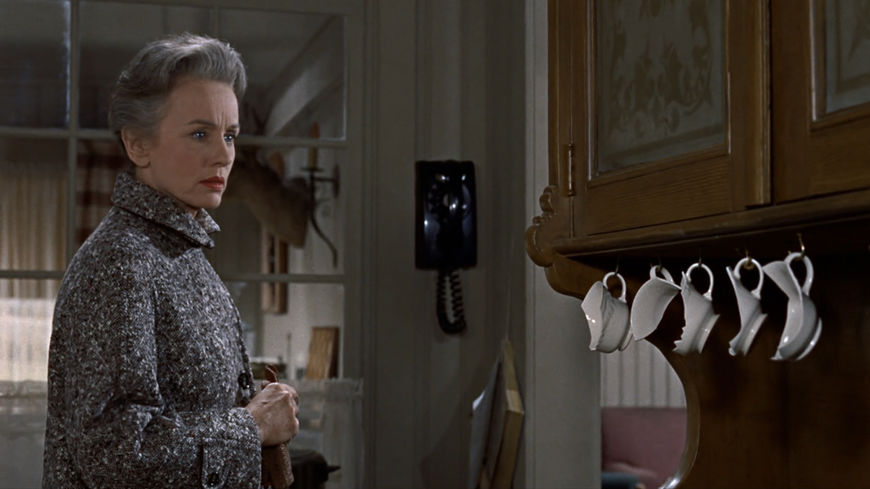
A number of teacups hanging from hooks under the credenza have all been broken. The camera moves in on Lydia, taking in her reaction. We can tell from the look on her face that she immediately knows what has happened. It is a chilling moment that always gives me goosebumps.
Against her better judgment, Lydia now enters the corridor to the bedrooms. The suspense of this moment is impossible to describe, nor is it possible (for this writer, at least) to explain how Hitchcock manages to create such suspense, and such ominousness, from a simple shot of a woman moving hesitantly down a dimly lit corridor. Silence is, again, an important element. Lydia finds the door to Fawcett’s bedroom ajar. She peers into the room and sees that it is a complete shambles. In staging this scene, Hitchcock followed Hunter’s description of the setting very precisely, so it is worth quoting it here:
A standing floor lamp, the shade dangling, but the light still burning; a picture hanging askew on the wall, its glass shattered; the window to the left of the picture, every pane of glass shattered; a dresser with two stuffed birds on its top; both birds have been badly damaged, the stuffing ripped out of them, the head of one hanging at a crooked near decapitated angle; the window to the left of the dresser, all the panes shattered.
I have always found the inclusion of stuffed birds here very odd (as if there weren’t enough live birds in the movie!). Hitchcock also adds a dead gull, smashed against the outside of the broken window. The camera follows Lydia’s point of view as she scans the room. Her eyes turn to the floor, behind the door. We see a pair of bare feet and the ends of tattered and bloody pajama bottoms. Lydia’s eyes widen in horror — but she must, she simply must continue looking. She peers behind the door to see that the legs belong to the unfortunate Dan Fawcett, lying dead on the floor, face covered in blood, with two black holes where his eyes once were. Fawcett’s face is revealed in three shots in rapid succession, each nearer to the man’s awful face, ending in a tight closeup. Hitchcock pulls us in and we are forced to look, just as Lydia is.
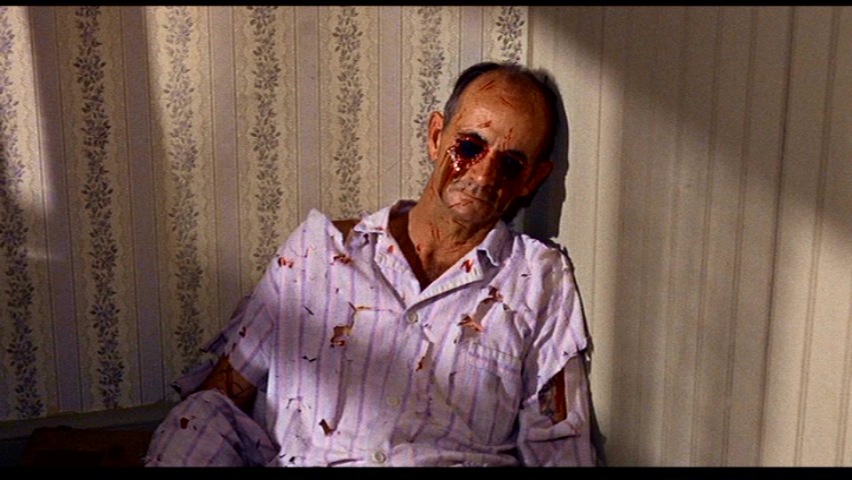
The shots of Fawcett’s face are genuinely horrifying, and it is possibly the grisliest moment in any Hitchcock film (more graphic than anything in Psycho). This scene is guaranteed to shut up jaded, modern viewers who may have jeered the lack of realism in earlier parts of the film. Audiences generally assume that the effect was accomplished with very good makeup. What is fascinating is that it was actually accomplished with a matte painting. For the uninitiated, matte painting is a cinematic special effect in which part of a setting is painted onto a sheet of glass. The camera photographs the setting through the glass, creating the illusion that what is in the painting is actually physically present. As noted in our last installment, a matte painting of Hitchcock’s fictitious version of Bodega Bay is used in the scene when Melanie cuts across the water in the motorboat. When Hitchcock showed that particular scene to one of his assistants, she remarked: “It looks just like a painting.” He was concerned, thinking that she could see through the artifice. In fact, she thought the footage was of the actual town and meant that she thought the shot was so beautiful it could be a painting!
The art of creating such beautiful but realistic matte paintings is now mostly “lost,” since it has been superseded by CGI (which I honestly find far less impressive than matte paintings, and no more “realistic”). The acknowledged master of the art was the late, great Albert Whitlock, who produced the paintings for The Birds. In this scene, Whitlock painted two very black dots on a sheet of glass, and the actor playing Dan Fawcett (face already daubed with fake blood by the makeup man) was photographed through it. The result is that we feel we are staring into two black abysses. The effect is, of course, deeply unsettling.
What happens next is, arguably, just as dramatic. Utterly traumatized, Lydia drops her handbag and half staggers, half runs down the corridor and out of the house. The screenplay specifies that she utters a “terrified scream” and that she continues screaming, “as if she is unable to stop it.” When it came time to film the scene, however, Hitchcock decided to have Jessica Tandy do the exact opposite of this. Once again, silence dominates. Instead of screaming, Lydia has what psychologists call a “hysterical reaction”: she is temporarily unable to scream or to speak. She careens down the corridor, mouth agape struggling to scream, then exits the house. Camera stationed at the front gate, Hitchcock shoots Tandy at a low angle as she rushes out of the house, stopping for a moment next to the confused farmhand, head tilted toward the sky, gagging slightly, still struggling to scream. It is an Oscar-worthy performance from Tandy, who is excellent in the entire film.
Lydia climbs into her truck and drives at breakneck speed back to her own house. (Hitchcock made sure the road from the Fawcett farm was covered in fuller’s earth so that the truck would kick up lots of dust.) When she arrives back at the house, Mitch and Melanie are together in the driveway. She clambers out of the car and Mitch can immediately see that something is very wrong. But seeing her son together with Melanie is more than Lydia can take right now. Sobbing, she pushes them apart and rushes into the house.
To be continued. . .
If you want to support our work, please send us a donation by going to our Entropy page and selecting “send paid chat.” Entropy allows you to donate any amount from $3 and up. All comments will be read and discussed in the next episode of Counter-Currents Radio, which airs every Friday.
Notes
[1] I do not mean to imply the dialogue was written by Cronyn. It was undoubtedly written by Hunter, at Hitchcock’s direction.
[2] However, my conclusions here are not those of Freud.
The%20Birds%20Or%3A%20Everything%20You%20Always%20Wanted%20to%20Know%20About%20Coronavirus%20%28But%20Were%20Afraid%20to%20Ask%20Hitchcock%20and%23038%3B%20Heidegger%29%2C%20Part%20Two
Share
-
- Gab
- Or: Everything You Always Wanted to Know About Coronavirus (But Were Afraid to Ask Hitchcock Heidegger), Part Two &body=%0D%0A%0D%0A%0D%0A%0D%0A%0D%0A%0D%0Ahttps://counter-currents.com/2020/05/everything-you-always-wanted-to-know-about-coronavirus-but-were-afraid-to-ask-hitchcock-heidegger-part-two/%0D%0A%0D%0A%0D%0A%0D%0A">
Enjoyed this article?
Be the first to leave a tip in the jar!
7 comments
I really need to watch this movie again. It’s been decades.
Watched this movie last weekend for the first time in decades. It reminded me of Night of the Living Dead.
This has been a great commentary so far. Looking forward to the next installment.
These articles are brilliant, but while the author and all commenters seem excited about Hitchcock in general and nightmares as ‘Birds’ and ‘Psycho’ in particular, I want to ask a naive question:
Is it really the purpose of ‘art’ to produce horror or other negative feelings in the audience ?
Is the original concept of art: edification (“Erbauung”) – leaving the audience with a ‘higher’ feeling of their lower reality – really outdated (or ‘post-modern’) ?
If yes, when did that degenerate art concept start?
Bert Brecht, the father of “Mack, the knife” and other communist propaganda stated explicitly that he wanted the audience to leave the theater with “an uncomfortable feeling”.
I guess, the narcissistic cameo-Hitchcock would agree, provided it channels into fame and money.
On the other hand, to continue the German lessons of the author:
“Kunst” (art) derives from “können” – in this context meaning “skill” – and there can be no doubt that the work of Hitchcock are skillful horror productions.
And we shouldn’t forget that he started his horror shows with allied propaganda movies in WWII.
Absolutely !! Your observations of the purpose of art, are relevant and your characterization of the character and career of the great Hitchcock are, are equally relevant as a part of summing up the mans work and life.
Spontaneously, over the years, I became less and less enamored of Hitchcock. Does everything, in order to avoid being sappy and sentimental, have to enter realms of ugliness? I am sorry that I actually enjoyed rubbish like Frenzy and Psycho. One fine day something in me just snapped and I saw these and some of his other films for what they are. I think I may have realized it at the same time I saw some of his shameless propaganda films.
Love how this is everything I wanted to know about The Birds but the title only mentions the Chinese disease.
Comments are closed.
If you have Paywall access,
simply login first to see your comment auto-approved.
Note on comments privacy & moderation
Your email is never published nor shared.
Comments are moderated. If you don't see your comment, please be patient. If approved, it will appear here soon. Do not post your comment a second time.
Paywall Access
Lost your password?Edit your comment